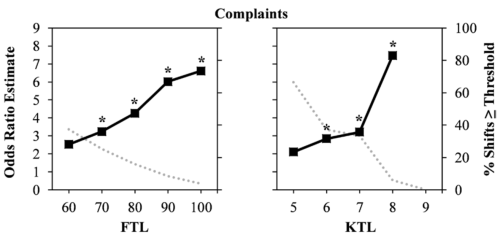Issue #78 – August 23
Welcome to Focus on Fatigue!
In our recent conversations with clients, the significance of fatigue’s impact on service delivery has repeatedly emerged. So, in this edition of Focus on Fatigue, we wanted to consider the broad reaching influence of fatigue – going beyond the realm of safety outcomes – to delve into its profound effects on service quality. Read on to see how quality sleep promotes quality service!
The FRMS Team
Views expressed in articles and links provided are those of the individual authors, and do not necessarily represent the views of InterDynamics (except where directly attributed).
Quality Sleep! Quality Service!
The impact of fatigue on service delivery
When we talk about workplace fatigue, the emphasis is often on safety outcomes. While safety is rightfully an important concern, the repercussions of fatigue on service quality and customer interactions are also significant. While we know that fatigue can lead to reduced reaction speed, reduced accuracy and microsleeps, even before we reach this point, fatigue impacts mood and communication, diminishes emotional intelligence and impairs decision making. These impairments affect service delivery and service outcomes.

Emotional Intelligence and Service Excellence
Emotional intelligence forms the bedrock of exceptional customer service. The ability to understand, manage, and connect with emotions, both one’s own and others’, is crucial for fostering positive interactions. However, a study published in the journal Sleep Medicine highlights how sleep deprivation diminishes emotional intelligence. For service-oriented industries, such as healthcare and law enforcement, where customer interactions are frequent and diverse, emotional intelligence is pivotal. Fatigued employees may struggle to read cues, respond empathetically, or manage challenging situations effectively.
Impaired Cognitive Skills and Customer Relations
Constructive thinking and effective decision-making are cornerstones of quality service delivery. Research has shown that sleep deprivation impairs cognitive skills necessary for problem-solving and innovation. In roles that demand quick thinking and constant interaction with the public, these impairments can lead to suboptimal solutions and inadequate responses.
Customer Complaints
The impact of fatigue on service quality can clearly be seen in a study featured in the journal Sleep looking at the relationship between predicted fatigue levels (utilising FAID Quantum) and public complaints. The study found that greater predicted fatigue and reduced sleep opportunity were strongly associated with an increase in public complaints.

Implications
Along with emotional intelligence and cognitive skills, fatigue also takes a toll on mood, motivation and productivity; reducing an individuals willingness to ‘go the extra mile’. Fatigue impairments can lead to misunderstandings, miscommunication, escalated encounters, longer resolution times and service errors, resulting in dissatisfied customers, adverse outcomes and complaints. Furthermore, fatigue can ripple through organisations, leading to absenteeism and higher staff turnover, further diminishing quality of service delivery.
Mitigating Fatigue for Enhanced Service Delivery
Organisations in service-oriented sectors can enhance service quality by prioritising fatigue management strategies. Investing in employee well-being by promoting healthy sleep practices, managing workloads, and providing opportunities for rejuvenation can have a profound impact. Encouraging short breaks, facilitating better work-life balance, and fostering a supportive work culture can significantly reduce the prevalence of fatigue.
References
Gordon, A. M., & Chen, S. (2014). The Role of Sleep in Interpersonal Conflict: Do Sleepless Nights Mean Worse Fights? Social Psychological and Personality Science, 5(2), 168–175. https://doi.org/10.1177/1948550613488952
Killgore, W., Kahn-Greene, E., Lipizzi, E., Newman, R., Kamimori, G. & Balkin, T. (2008). Sleep deprivation reduces perceived emotional intelligence and constructive thinking skills. Sleep medicine. 9. 517-26. https://doi.org/10.1016/j.sleep.2007.07.003
Paterson, J.L., Dorrian, J., Ferguson,S.A., Jay, S.M., Lamond, N., Murphy, P.J., Campbell, S.S., & Dawson, D.
(2011) Changes in structural aspects of mood during 39–66h of sleep loss using matched controls,
Applied Ergonomics, 42(2), 196-201, https://doi.org/10.1016/j.apergo.2010.06.014.
Riedy, S. M., Dawson, D. & Vila, B. (2019). U.S. police rosters: Fatigue and public complaints, Sleep, 42(3), zsy231, https://doi.org/10.1093/sleep/zsy231
Riedy, S., Dawson, D., Fekedulegn, D., Andrew, M., Vila, B., and Violanti, J. (2020), Fatigue and Short-term Unplanned Absences Among Police Officers, Policing: an International Journal, http://doi.org/10.1108/PIJPSM-10-2019-0165
Whitney, P., Hinson, J., Jackson, M. & Van Dongen, H. (2015) Feedback Blunting: Total Sleep Deprivation Impairs Decision Making that Requires Updating Based on Feedback, Sleep, 38(5), 745–754. https://doi.org/10.5665/sleep.4668
InterDynamics News
FAID Quantum Training
We have conducted FAID Quantum training with a number of different clients recently and the feedback we are receiving is that this training has been highly insightful and valuable.
Here’s an a couple of example of the feedback we have received:
“We found immense value in the training today. Peter was brilliant!”
“The training session was well received and benefited the group.”
We tailor our training to the client and organisation, to assist in addressing your unique circumstances and ensuring you get the most out of the process.
If you think your organisation might benefit from training and you would like to know more, please get in touch.
